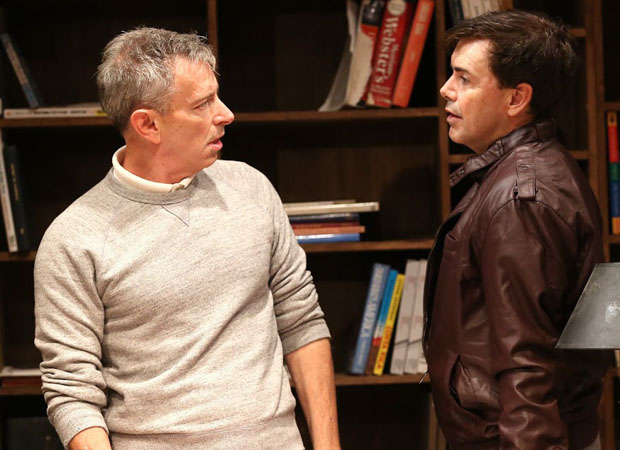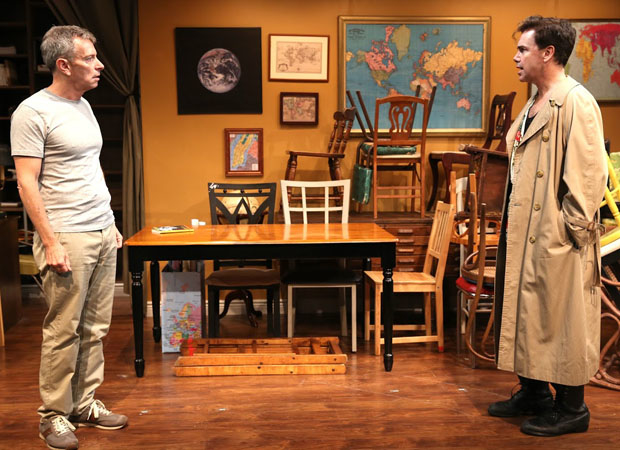Lonely Planet

(© Carol Rosegg)
Canonically, the theater world has a tendency to remember only three works about the effects of the AIDS crisis: Tony Kushner's Angels in America, Larry Kramer's The Normal Heart, and Jonathan Larson's Rent. Though there are plenty of others, they've had a tendency to fade into the background.
One such example is Steven Dietz's Lonely Planet, a 1994 two-hander now being presented in its first major revival by Keen Company at the Clurman Theatre. Though Jonathan Silverstein has directed a production featuring two treasures of the off-Broadway community, Arnie Burton and Matt McGrath, it's easy to see why this particular text is rarely regarded in the same breath as its seminal contemporaries.
The setting is "a small map store on the oldest street in an American city." Afraid to go out in the world, shop owner Jody has been holed up inside the store (a precisely realized set by Anshuman Bhatia) for an unspecified amount of time. Each day, he's visited by his friend Carl (McGrath), a flamboyant individual who holds a wide variety of jobs and, for some unknown reason, has started to bring a different chair with him to leave in the store upon each visit.

(© Carol Rosegg)
Slowly, Dietz starts revealing the truth behind the situation presented to us: There's a plague out in the world that's killing their friends. Carl's job is that he helps clean out the houses of AIDS patients after their deaths, but he cannot bring himself to get rid of their empty chairs. Jody hasn't left his store because he refuses to admit to himself that something bad is happening. And he's too afraid to get tested.
Clocking in at under two hours including a needless intermission, Lonely Planet has a hard time figuring out what it wants to be: Is it a poignant tearjerker or an absurdist fantasia (on national themes)? Dietz can't make up his mind. Every time he takes us in the former direction, with beautifully despondent (if overly garrulous) monologues about what the crisis means to their community, the tone quickly shifts to a flight of whimsy, many of which are surprisingly literal. It's a play that stylistically resembles Ionesco's The Chairs mainly because it hits the nail very squarely on the head by having the characters read Ionesco's The Chairs.
Fortunately, when the loquacity of the play becomes soporific, the performances more than make up for it. Burton and McGrath, who are typically known for their scene-stealing and scenery-chewing comedic performances, both go much deeper than that. As Jody, Burton gets to be the straight man for once, delivering in a deeply heartrending turn as a man who needs to look squarely at the devil but doesn’t quite have the inner strength to do so. Carl is the showier role, and McGrath milks it for all it's worth. But when the time comes for Carl to sear, McGrath spits fire.
Silverstein stages the play with sensitivity, though over the course of its duration, it ultimately becomes clear why Lonely Planet is rarely regarded in the same breath as seminal works like Angels in America and The Normal Heart. Those pieces of theater are timeless, firmly situated in period but speaking just as strongly to the world today as they did when they first premiered. Lonely Planet only rarely offers that same quality, leaving the audience cut off from its world, in a lonely planet of their own.










